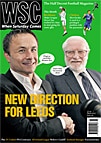 Neil Rayment looks back at that rarest of seasons – one in which Newcastle actually won something
Neil Rayment looks back at that rarest of seasons – one in which Newcastle actually won something
The long-term significance
In the days when FA Cup finals were played at Wembley, Cardiff became the first team to take the Cup out of England when they beat Arsenal 1-0. As well as becoming a question beloved by pub-quiz compilers ever since, the game was also notable for being the first final to be broadcast live on the radio. In order to help listeners get a sense of what was happening, the commentator referred to a grid printed in the Radio Times, which divided the pitch up into eight sections. It has since been claimed that this was the origin of the term “back to square one”, though that phrase doesn’t crop up in surviving radio commentaries from the period.
Story of the season
Unbeaten Leicester led the table until early October. They then didn’t win any of their next five matches and were replaced at the top by Burnley, followed by Sunderland, who held on to the top spot until the new year. Newcastle then took over, a position they held for the rest of the season as they went on to win their fourth and, to date, last title. Sunderland were still in contention until they were beaten 1-0 at St James’ Park on March 19 before a record crowd of 67,211. The goalscorer was 5ft 5in Scotland centre-forward Hughie Gallacher, still widely rated as Newcastle’s finest ever player. Gallacher’s haul of 36 League goals plus three in the FA Cup set a club record only surpassed by Andy Cole in 1993-94. Other notable players included rugged defender Frank “Old Surefoot” Hudspeth, who spent 19 seasons at the club, and left-winger Stan Seymour who was later a club director and de facto manager for two of Newcastle’s FA Cup wins in the 1950s.
Huddersfield, champions for the previous three seasons, finished runners-up. Sunderland at least had the consolation of being top scorers and had a prolific Scottish striker of their own in 35- goal David Halliday. They also fielded a winger with a fantastic name – Billy Death.
At the other end of the table, Everton got off to a dreadful start. Suffering their worst season since becoming founder members of the League in 1888, they didn’t win a match until the end of September when Liverpool were beaten 1-0. Together with West Brom they were anchored to the bottom nearly all season and looked certainties for relegation. Everton were saved, however, by the quite stunning loss of form that struck Leeds between Christmas and Easter. They only managed one win in 17 games and plummeted from a comfortable mid-table position to eventual relegation alongside West Brom. Everton went on to win the championship the following year.
For the record books
The previous year had seen the introduction of the new offside law, which meant that to remain onside only two players – rather than three as had previously been the case – needed to be between the attacker and the goal. This resulted in an unprecedented number of high scores: there were three 7‑3 results while Derby’s 8‑0 victory against Sheffield Wednesday was the biggest win.
In the Second Division, champions Middlesbrough scored 122 goals, 59 of them scored by centre-forward George Camsell. Both figures were records at the time, though Camsell’s feat was bettered by Everton’s Dixie Dean a season later. In Division Three (South), Plymouth Argyle finished runners-up for the sixth consecutive year – only the champions were promoted from that division in those days.
Same place today
Only Arsenal have remained in the top flight without interruption; Everton are next best, having missed four seasons. In total, 12 sides from the First Division are in today’s Premiership.
Moved furthest away
Bury only had two more seasons at this level before being relegated, never to return. Huddersfield left the top flight for the last time in 1972 and are the only other side currently outside the top two divisions.
Went on to greater things
Dixie Dean ~ Scored twice on his international debut, England’s 2-1 win in Scotland, their first victory there in 23 years. The striker hit 18 goals in 16 appearances for England and a record 349 for Everton.
George Allison ~ The first ever radio commentator. He later managed Arsenal, taking over during the title season of 1933-34 after the sudden death of the legendary Herbert Chapman.
Eric Brook ~ Man City’s all-time top scorer was enjoying only his second League season, with Barnsley. Subsequently starred in the City sides that won the FA Cup in 1934 and the title in 1936-37.
Disappearing from view
John Chapman ~ The Manchester United manager lost his job after being suspended by the FA for unspecified “financial irregularities”. He was the first of six managers who were sacked during the course of the season.
Ted Vizard ~ Bolton’s mercurial winger made his final appearance for Wales to bring to an end a 16-year international career.
Aberdare Athletic ~ The south Wales club finished bottom of Division Three (South) and lost their place in the League to Torquay United; they disbanded a year later.
From WSC 241 March 2007. What was happening this month